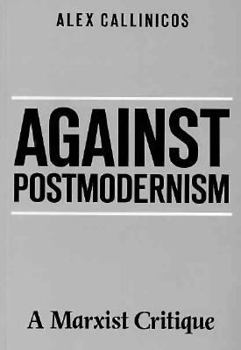Against Postmodernism: A Marxist Critique
Select Format
Select Condition 
Book Overview
It has become an intellectual commonplace to claim that mankind has entered the era of post-modernity. Three themes are embraced in this claim - the poststructuralists critique by Foucault, Derrida... This description may be from another edition of this product.
Format:Paperback
Language:English
ISBN:0312042256
ISBN13:9780312042257
Release Date:January 1990
Publisher:Palgrave MacMillan
Length:207 Pages
Weight:0.75 lbs.
Dimensions:0.5" x 6.0" x 9.0"
Customer Reviews
2 ratings
a nice argument for not jumping in the current bandwagon
Published by Thriftbooks.com User , 23 years ago
I have been engaged in an study of philosophy only for the past two years and mostly for my interest in politics and social science. I like many people have heard this word "postmodernism" a lot before studying philosophy and of course wandered what all these was about. Now after really sudying the current trends in philosophy and how things were in that field not too long ago i have to say that intellectuals are not different from children always chasing for the new toy to buy or adeolecents following the latest musical trends or latest trends on fashion just because its popular. Dissilusion intellectuals who were too inocent to believe that 1968 was going to be the revolution who later drifted into this "postmodernism" as almost escapism but without forgetting their radicalness (is that a real word in english)is an important argument that Callincos makes although i wish he treated how strange is to see some Leftists calling themselves postmodernists without thinking how complaining so much about modernism as to call oneself postmodernist does not sound too far from conservative or fascist gloom, anti-rationality and nihilism because lets remember in these postmodern times in which "metanarratives" have been discredited we have seen a reinassance of anti-rational, sectarian, nihilistic and fascistic nationalism everywhere. Personally after studying what these postmodernism was all about i thought it must be a philosophical trend dominated by political and social conservatives being after all so much inspired by Mr. Nietzche and nazi symphatizer Mr.Heidegger and arguing so much on points of no return wich negates us the posibbility of further significant positive changes.Like Callincos argues nevertheless its almost just funny to see all these theoretical elaborations from these relativists trying to convince us these times are so much different from say before 1975 and also trying to convince us of some suposedely points of no return which if anyone will distance Michel Foucault work from all this postmodernist blabla will see that all of these is just another passing fad. This is not to deny "postmodernism" any real value or interesting insight something which Callincos doesnt do either, but his interesting analysis of the current situation of societies, the economy, the arts and of politics could let us separate in some ways what is going on right now from exagerations of the interpretation of current or fashionable ideologies or trends and also let us see how much these later are shaped by the first ones. I guess in a few words many of the readers of this book will be ones who just dont like to be trendy.
Tough, but worth it
Published by Thriftbooks.com User , 24 years ago
Alex Callinicos is, at heart, a political activist, a revolutionary socialist who is involved with day-to-day organizing. It is this practical work, I think, that makes him such a powerful critic of postmodernism. Without one foot in the real world, nobody could confront such a steaming pile of academic nonsense without sliding into complete irrelevance.Alex starts off with a strong, refreshing judgement:"I do not believe that we live in 'New Times', in a 'postindustrial and postmodern age'... I deny the main theses of poststructuralism, which seem to me in substance false. I doubt very much that Postmodern art represents a qualitative break from the Modernism of the early twentieth century. Moreover, much of what is written in support of the idea that we live in a postmodern epoch seems to me of small calibre intellectually, usually superficial, often ignorant, sometimes incoherent."But, of course, he has to defend these claims, which (unfortunately) requires delving into the postmodernist babble about "discourse" and "metanarratives." As a result, this book is a very very difficult read, even for those who are familiar with postmodern theory. In the preface, Callinicos even seems to regret having to follow such a "tortuous path." But the journey is well worth it, thorns and all, especially for exasperated college students who must grapple with these ideas in their classes.Alex does not boil down all opposing theories to his own viewpoint. In fact, this book points out many of the open questions that remain in philosophy and social theory. In every area, however, postmodernism proves to be a dead end, leading to political inactivity and confused relativism.Rather than simply dismissing these views, Callinicos unearths their historical roots. Postmodernism is not just bad philosophy; it is the reflex of disillusioned intellectuals. When the revolts of the late 60's and the hopes of Stalinist "socialism" both collapsed, many radical academics retreated to their snail's shell of empty theory.Alex's ability to see postmodernism in context comes from his grounding in active, classical Marxism. If you can make it past the thick stew of difficult terms, this book will do more than help you fend off fashionable academic trends. It will also point the way forward to a revolutionary Marxist tradition, where philosophical and political debates do "not take place in discourse but on the terrain of politics itself."





